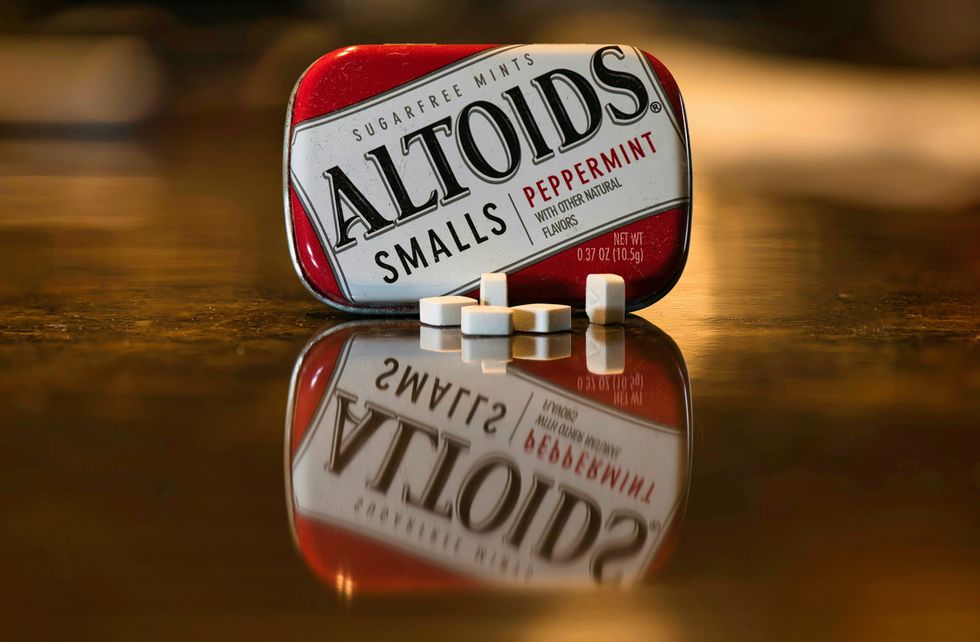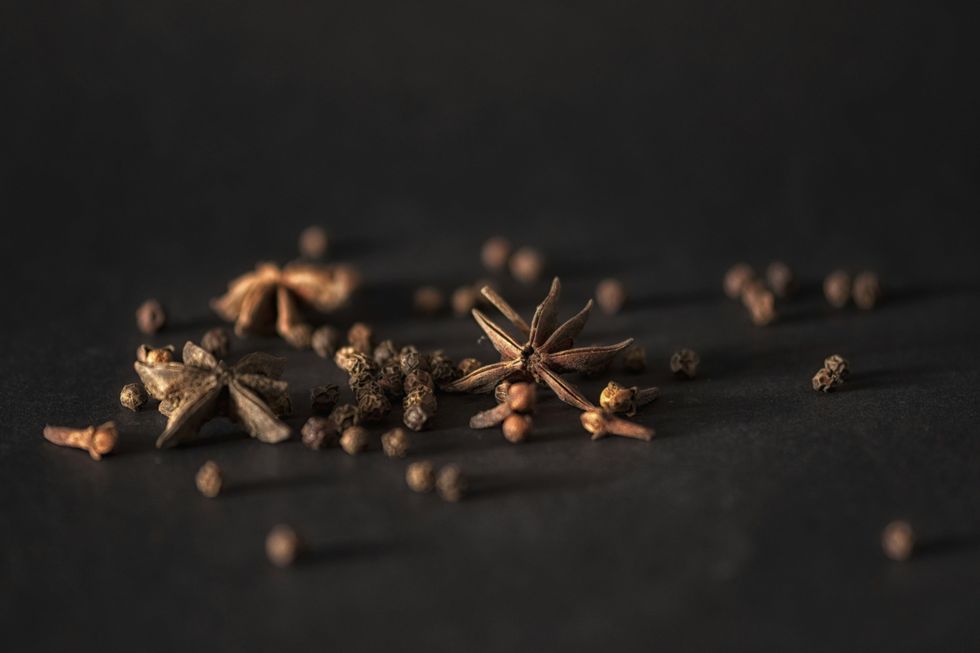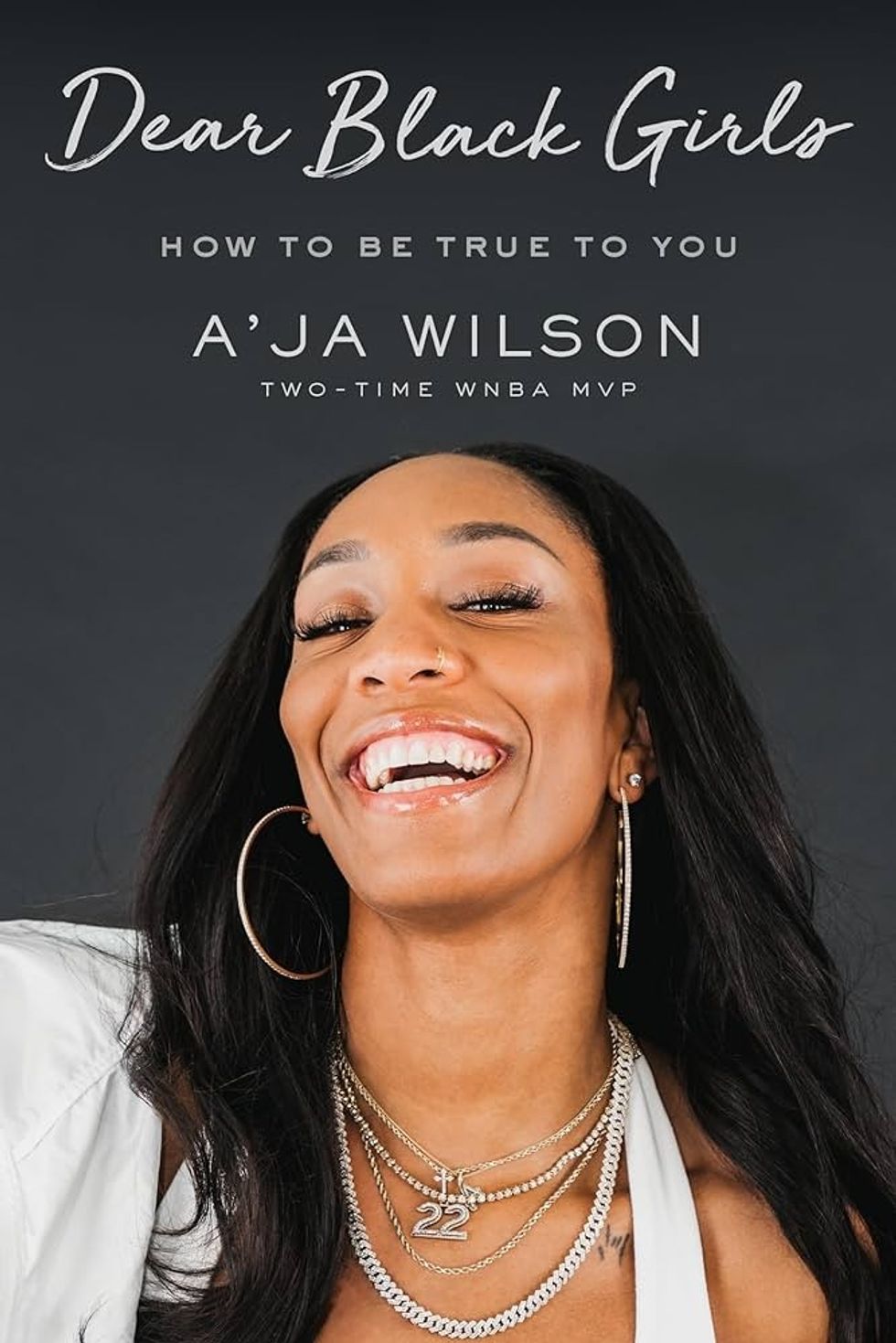'Dear Black Girls': How A'ja Wilson Is Helping Black Girls Heal & Bloom With Confidence

In recent years, books written by Black women, such as Viola Davis, Michelle Obama, and Taraji P. Henson, have adorned our shelves and shown the great trials and tribulations one has had to endure to become the woman we see today. Though their narratives show great accomplishments, they explain in detail the price that had to be paid to achieve their monumental success. Often, this price came at the cost of having to endure unspeakable tragedy. The world was being carried on their shoulders and backs, and they had to learn to balance the weight of it all. Despite the odds, they managed to grow and become exceptionally talented women with limited support or, most of the time, alone.
However, in A'ja Wilson's recently published book, Dear Black Girls, this narrative is changing for the better. The memoir shows that WNBA superstar, and growing legend, A'ja Wilson isn't just a force to reckon with on the court, racking up championships, MVP awards, Olympic gold, and season-record-breaking accomplishments. Her impact transcends the game, reaching into the hearts of young Black women and girls, who like me might have once felt a pang of otherness for embracing their inner tomboy.
Wilson's recently published book offered a powerful remedy, a story that mirrored my own experiences and gently soothed the wounds of not always fitting in. This collection of honest stories is not just about Wilson's journey, it's also a book that holds the potential to heal and inspire countless other Black girls who deserve to see themselves reflected in the pages of a champion.
Although Wilson discusses the tribulations she had to overcome, she didn't have to do them alone and often had more than one support system installed to ensure her success. This book ultimately shows the beauty that grows when Black girls are raised with nourishment, intentionality, and understanding rather than the unrelenting grief and sadness that many believe are necessary to raise Black girls.
In Dear Black Girls: How to Be True to You, the two-time MVP shows us that love, rather than unending tragedy, can be the source of success for all Black girls--past, present, and future. Wilson also shows us how love can occasionally come from an unexpected source--a stranger who only has compassion, empathy, and understanding to offer.
Living While Black
There comes a point in time, in every Black girl's life, where they learn that they are not just a girl, but a Black girl. For me, it was on the playground of my elementary school, where a white girl--who I thought was my friend--called me the n-word when I refused to join her in a fight against a mutual friend. For A'ja Wilson, it was when her "friend" refused to invite her to her house for a sleepover, unless she slept outside. When asked why she had to be the only one to sleep outside, she was quickly informed it had been due to her race. Though her parents discussed it with her and explained why she and the young lady could no longer be friends, A'ja Wilson offers a relatable lens to express the grief of realizing one's otherness.
The year she discovered her Blackness meant a difference, Wilson felt alone and began isolating herself. It wasn't until she met a woman who worked in the cafeteria that she understood the importance of being seen by someone who looked like her. In Dear Black Girls, Wilson teaches the importance of representation and finding someone who "looks like you" and actively cares and checks in with you. Though the young readers of this book will most likely never meet Wilson, she provides her novel as a stand-in role model who actively sees how alone some Black girls feel in the world and tells them lovely: "I see you, I got you."
Finding Oneself
There is a certain power in discovering one's "why." In Dear Black Girls, Wilson explains that in order to find oneself or one's reasons for doing things, it might be important to look to your elders. The ones that could make you believe in yourself. For Wilson, it was her grandmother. Her grandmother was her place of solace and the person she felt closest to. Before she picked up the game of basketball, A'ja's grandmother believed she was special and would achieve so many things in life.
Through this belief, she nurtured Wilson and taught her to believe in the good that everyone had to possess. She taught Wilson that Black women could be heroes, and knew how to "walk the walk" and "talk the talk." She taught Wilson, and in turn, Wilson has taught Black girls, that finding oneself can be done at the hands of the ones that we love. And that if one's love is strong enough, we can "freeze it, and preserve that safe space forever."
It's Okay to Be Different
In school, Wilson was considered a "slow learner." Diagnosed with dyslexia at the late age of 16, she believed she had not been as "smart" as the other kids. Wilson would freeze up in class, and despite loving to write narratives and the school itself, she found she did not catch on with her peers as quickly as she liked. She spent hours on end stressing about being different, so much so, that at times the thought of her otherness became debilitating and all-consuming. With her family and in her solitude, she understood who she was. However, among her friends and in class, she found that she didn't know who she was, nor who they wanted her to be.
From this, she taught Black girls that being a teen is stressful enough, so being oneself should be easily embraced. Though, she admits to not knowing the right thing to say, do, or act, and therefore is unable to give us "cheat codes," the best thing a young Black girl can do, is just be.
Find Your Gardener
I often say that Black women have learned to grow without nourishment. So, in reading Dear Black Girl, it was a refreshing change of pace to read that Wilson had been adorned with love, guidance, honesty, and protection by strong support systems in her life. One of those support systems was Wilson's father. Her father taught her many things in life, but one that was most essential was the importance of perseverance and overcoming mediocrity. See, despite being the best in her career, Wilson and basketball did not mesh well from the start. Instead, she had been known to try many things and was lackluster at best.
Nevertheless, when Wilson was told that she did not play well by her father--after asking why she wasn't getting any playing time--she finally learned to overcome her challenges.
Not because she suddenly practiced more, or believed she could do anything with time. She became better because her father gave her the option to walk away from the sport. He allowed her to be scared, to be unsure of what she wanted in life, and freed her of the stress of absolutes. Through encouragement, he became her gardener--always trying to bring out the best in her through "easy" and "tough" love. In Dear Black Girls, Wilson encourages Black girls to find their "gardeners," the people in their lives who bring out the best in them, drive them crazy and are never afraid to tell them how it is. The person that pulls out all of the weeds and negativity, and leaves enough space for you to receive sunlight and bloom.
Gaining a Nonsense Detector
While finding a gardener, Wilson also encourages Black girls to find or gain a "nonsense detector." A nonsense detector is just as it sounds, someone who can detect the nonsense that the world is attempting to bring to them and help them identify what it truly is. They are the person who is willing to approach a spade and call it by its name. In Wilson's life, this was her mother. A'ja's mom encouraged her to think logically about her education and its relationship to her basketball career.
She was the person Wilson called when she learned to drive in a new state or deal with the stress of her newfound career. Through her mother's encouragement, she learned not to chase after boys or some concept of a new sense of self, instead, she learned to make decisions with her best interest in mind. In doing so, she chose family, which meant more time with her grandmother, which she would not have had if she hadn't learned to listen to something that encourages no-nonsense.
Grief Has No Timeline, Knows No Bounds
In 2017, during her junior year of college, A'ja Wilson was known as one of the best players in the NCAA. After two seasons of coming up short of winning a national title, she had finally accomplished her goal of winning with Dawn Staley's South Caroline Gamecocks. However, the win was bittersweet, because the champ had been grieving the loss of her grandmother, one of her biggest support systems.
During this time, Wilson discovered that grief could not be neatly packed away in a box, waiting to be unraveled when she had prepared to deal with it. She noted that it was an unending rollercoaster where lows felt all-consuming and endless.
In Dear Black Girls, Wilson discusses the importance of experiencing grief at its pace, and on your own timeline. She explains to young Black girls that the feeling of despair and paralysis is normal and that instead of trying to climb out of the sadness, sometimes it is beneficial to wade through it, with the people you care about. Not only this, she encourages Black girls to embrace support that may be considered unexpected, through a beautiful anecdote involving Dawn Staley.
The champ mentioned the coach drove down to her house, upon hearing about the death of her grandmother, and sat in silence with the athlete as she cried. She informed her that she could take all of the time that she needed and that the "team would be waiting for her when she was ready to return."
You Don't Know What You Don't Know
The issue that many people hold today is they expect to be perfect. Though we know perfection is merely a concept, and the only thing perfect about perfection is the word itself, many dwell on being perfect and having the foresight to ensure it is so. When perfection is inevitably unattainable, we punish ourselves for not knowing better or being fallible. Nevertheless, dwelling on things, especially in relation to being perfect, is nothing more than wasted energy.
In Dear Black Girls, Wilson--through a humorous anecdote of her WNBA drafting day--points out that everyone makes mistakes and that many should not be ashamed for not knowing what they hadn't known before. Instead, beauty lies in learning and giving oneself credit for the knowledge that you now have for navigating future situations. Instead of beating yourself up, Wilson tells young Black girls there is no point in beating themselves up and to allow grace in moments of uncertainty and error.
Protect and Nurture Your Mental Health
The idea of seeking therapy is often a hurdle for Black women. With societal expectations and generational aversions, the concept of the "strong Black woman" often overpowers the necessary, and sometimes dire assistance Black women should seek. In Dear Black Girls, A'ja Wilson points out that most Black women are the first, or one of few, in their families to accomplish significant achievements, such as going to college, getting a corporate job, or making a high-figured salary.
This results in pressure that cannot be seen as relatable by family members, and often results in anxiety disorders, growing, unrelenting pressure, and crippling stress. To solve this, Wilson encourages Black girls to seek help outside of themselves and their friends, to ensure they are not taking on the weight of the world, simply because it was placed on their shoulders. Black women need someone to talk to, especially when it has been ingrained since birth that we should nurture and care for everyone but ourselves. By seeking a therapist, this narrative can change, and the idea of being a "strong Black woman" can come from the idea of learning to be vulnerable and asking for help.
Be Your Own Hero
It is heroic to take control of your own life. Being your own hero gives you confidence and reassurance to face obstacles directly, to follow your passion, and to define success how you see fit. It can be powerful and gratifying to become the best version of yourself and to allow yourself to be. In Dear Black Girls, Wilson teaches Black girls their final lesson, "If you can see them [your heroes], then you can be them." Many Black girls do not seek certain positions in life because they have never seen people who look like them in certain positions.
Nevertheless, Wilson explains the importance of having and seeking out representation, either in life or in media. Then, she encourages young girls to pursue that life they dream of, because anything is attainable with hard effort and--most importantly--love.
Check out A'ja Wilson and the 2024 Paris Women's Basketball Olympic team from July 26 through August 11.
xoNecole's I Read It So You Don't Have To is a recurring series of self-discovery that breaks down self-help books into a toolkit of takeaways and tips that are meant to assist you in finding the best life you can live. Take what works for you, and leave everything else where it is.
Let’s make things inbox official! Sign up for the xoNecole newsletter for love, wellness, career, and exclusive content delivered straight to your inbox.
Featured image courtesy
Exclusive: Viral It Girl Kayla Nicole Is Reclaiming The Mic—And The Narrative
It’s nice to have a podcast when you’re constantly trending online. One week after setting timelines ablaze on Halloween, Kayla Nicole released an episode of her Dear Media pop culture podcast, The Pre-Game, where she took listeners behind the scenes of her viral costume.
The 34-year-old had been torn between dressing up as Beyoncé or Toni Braxton, she says in the episode. She couldn’t decide which version of Bey she’d be, though. Two days before the holiday, she locked in her choice, filming a short recreation of Braxton’s “He Wasn’t Man Enough for Me” music video that has since garnered nearly 6.5M views on TikTok.
Kayla Nicole says she wore a dress that was once worn by Braxton herself for the Halloween costume. “It’s not a secret Toni is more on the petite side. I’m obsessed with all 5’2” of her,” she tells xoNecole via email. “But I’m 5’10'' and not missing any meals, honey, so to my surprise, when I got the dress and it actually fit, I knew it was destiny.”
The episode was the perfect way for the multihyphenate to take control of her own narrative. By addressing the viral moment on her own platform, she was able to stir the conversation and keep the focus on her adoration for Braxton, an artist she says she grew up listening to and who still makes her most-played playlist every year. Elsewhere, she likely would’ve received questions about whether or not the costume was a subliminal aimed at her ex-boyfriend and his pop star fiancée. “I think that people will try to project their own narratives, right?” she said, hinting at this in the episode. “But, for me personally – I think it’s very important to say this in this moment – I’m not in the business of tearing other women down. I’m in the business of celebrating them.”
Kayla Nicole is among xoNecole’s It Girl 100 Class of 2025, powered by SheaMoisture, recognized in the Viral Voices category for her work in media and the trends she sets on our timelines, all while prioritizing her own mental and physical health. As she puts it: “Yes, I’m curating conversations on my podcast The Pre-Game, and cultivating community with my wellness brand Tribe Therepē.”
Despite being the frequent topic of conversation online, Kayla Nicole says she’s learning to take advantage of her growing social media platform without becoming consumed by it. “I refuse to let the internet consume me. It’s supposed to be a resource and tool for connection, so if it becomes anything beyond that I will log out,” she says.
On The Pre-Game, which launched earlier this year, she has positioned herself as listeners “homegirl.” “There’s definitely a delicate dance between being genuine and oversharing, and I’ve had to learn that the hard way. Now I share from a place of reflection, not reaction,” she says. “If it can help someone feel seen or less alone, I’ll talk about it within reason. But I’ve certainly learned to protect parts of my life that I cherish most. I share what serves connection but doesn’t cost me peace.
"I refuse to let the internet consume me. It’s supposed to be a resource and tool for connection, so if it becomes anything beyond that I will log out."

Credit: Malcolm Roberson
Throughout each episode, she sips a cocktail and addresses trending topics (even when they involve herself). It’s a platform the Pepperdine University alumnus has been preparing to have since she graduated with a degree in broadcast journalism, with a concentration in political science.
“I just knew I was going to end up on a local news network at the head anchor table, breaking high speed chases, and tossing it to the weather girl,” she says. Instead, she ended up working as an assistant at TMZ before covering sports as a freelance reporter. (She’s said she didn’t work for ESPN, despite previous reports saying otherwise.) The Pre-Game combines her love for pop culture and sports in a way that once felt inaccessible to her in traditional media.
She’s not just a podcaster, though. When she’s not behind the mic, taking acting classes or making her New York Fashion Week debut, Kayla Nicole is also busy elevating her wellness brand Tribe Therepē, where she shares her workouts and the workout equipment that helps her look chic while staying fit. She says the brand will add apparel to its line up in early 2026.
“Tribe Therepē has evolved into exactly what I have always envisioned. A community of women who care about being fit not just for the aesthetic, but for their mental and emotional well-being too. It’s grounded. It’s feminine. It’s strong,” she says. “And honestly, it's a reflection of where I am in my life right now. I feel so damn good - mentally, emotionally, and physically. And I am grateful to be in a space where I can pour that love and light back into the community that continues to pour into me.”
Tap into the full It Girl 100 Class of 2025 and meet all the women changing game this year and beyond. See the full list here.
Featured image by Malcolm Roberson
If there is one thing that I am going to do, it’s buy myself some scented soy candles. And, as I was looking at a display of them in a TJ Maxx store a couple of weekends ago, I found myself wondering just who decided which scents were considered to be “holiday” ones. The origin stories are actually pretty layered, so, for now, I’ll just share a few of ‘em.
I’m sure it’s pretty obvious that pine comes from the smell of fresh Christmas trees; however, scents like cloves, oranges, and cinnamon are attributed to two things: being natural ways to get well during the cold and flu season, and also being flavors that are used in many traditional holiday meals.
Meanwhile, frankincense and myrrh originate from the Middle East and Africa (you know, like the Bible does — some folks need to be reminded of that—eh hem — Trumpers) and ginger? It too helps with indigestion (which can definitely creep up at Thanksgiving and Christmas dinner tables); plus, it’s a key ingredient for ginger snaps and gingerbread houses. So, as you can see, holiday-themed scents have a rhyme and reason to them.
Tying this all in together — several years ago, I penned an article for the platform entitled, “Are You Ready To Have Some Very Merry ‘Christmas Sex’?” Well, in the spirit of revisiting some of that content, with a bit of a twist, I decided to broach some traditional holiday scents from the perspective of which ones will do your libido a ton of good from now through New Year’s Eve (check out “Make This Your Best NYE. For Sex. EVER.”).
Are you ready to check some of them out, so that, whether it’s via a candle, a diffuser, some essential oil, or some DIY body cream (check out “How To Incorporate All Five Senses To Have The Best Sex Ever”), you can bring some extra festive ambiance into your own boudoir? Excellent.
1. Vanilla

Unsplash
When it comes to holiday desserts, you’re going to be hard-pressed to find recipes that don’t include vanilla — and that alone explains why it is considered to be a traditional holiday scent. As far as your libido goes, vanilla is absolutely considered to be an aphrodisiac — partly because its sweet scent is considered to be very sensual. Some studies even reveal that vanillin (the active ingredient in vanilla) is able to increase sexual arousal and improve erectile dysfunction in men. So, if you adore the smell, here is more incentive to use it.
2. Frankincense

Unsplash
Although, typically, when people think about frankincense (and myrrh), it’s in the context of the gifts that the wise men brought Christ after he was born; it’s a part of the biblical Christmas story. However, frankincense goes much deeper than that. Sexually, since it has an earthy and spicy scent, some people like to use it to meditate (check out “What Exactly Is 'Orgasmic Meditation'?”). Also, since it has the ability to put you in a better mood, soothe and soften your skin and maintain your oral health — with the help of frankincense, every touch and kiss can be that much…sexier.
3. Cinnamon

Unsplash
I already gave cinnamon a shout-out in the intro. Personally, I’ve been a fan of it, in the sex department, for a long time now (check out “12 ‘Sex Condiments’ That Can Make Coitus Even More...Delicious”). When it’s in oil form, it can be very sweet to the taste while sending a warm sensation throughout the body — which is why the giver and receiver of oral sex can benefit from its usage. Beyond that, cinnamon helps to increase blood flow to your genital region, elevate sexual desire and, some studies say that it can even help improve fertility. Beautiful.
4. Peppermint

Unsplash
If there’s a signature candy for the holiday season, it’s probably a candy cane — which automatically puts peppermint in the running for being an official holiday scent. Pretty much, in any form, it’s got your sex life’s back because it’s hailed as being a sexual stimulant; in part, because its smell is so invigorating. Plus, it helps to (eh hem) ease headaches, it gives you more energy and it can definitely help to freshen your breath. Also, that minty sensation? The same thing that I said about cinnamon can apply to peppermint too (if you catch my drift).
5. Ginger

Unsplash
Whether it’s in a meal or in your bedroom, ginger is going to produce results that are hella spicy. On the sex tip, science has praised ginger for being able to increase sexual arousal, improve blood circulation (which intensifies orgasms) and strengthen fertility for many years. Scent-wise, I find it to be one that both men and women enjoy because it is both woodsy and sweet. So, if you’ve got some massage oil in mind, adding some ginger is a way to please you both.
6. Pomegranate

Unsplash
September through December is the time of year when pomegranates are considered to be in season. And, as someone who is a Rosh Hashanah observer, I have a personal adoration for them because I am aware of the various things that they symbolize in Hebrew culture including the fact that they are a fruit that represents love and fertility. So yeah, they would absolutely be an aphrodisiac — one that is perfect for this time of the year. While consuming it helps to boost testosterone levels in both men and women, the floral bittersweet smell that it produces can help to reduce stress while promoting relaxation (like most floral scents do) — and the more relaxed you are, the easier it is to climax.
7. Nutmeg

Unsplash
Another signature seasoning during the holiday season is nutmeg. It’s perfect in Thanksgiving sweet potato (or pumpkin) pie and Christmas morning French toast. And yes, it can also make your sex life better. If you consume it, it can intensify your libido and, overall, its warm-meets-spicy-meets-sweet smell is so inviting that it is considered to be a pretty seductive scent.
8. Cloves

Unsplash
I ain’t got not one lie to tell you — if you’ve got a toothache, put some clove oil on that bad boy and send me a Christmas present for putting you on game. Aside from that, as I round all of this out, cloves are another holiday scent that can do wonders for your sex life. For men, it has the ability to significantly increase sexual arousal and improve stamina and endurance. For men and women alike, it also has a reputation for strengthening sexual desire. And for women solely? Well, if you want an all-natural way to increase natural lubrication down below — the scent and and feel (in DILUTED oil form) can make that happen. It can make the holidays especially special…if you know what I mean.
Ah yes — the atmosphere of the holidays and what it can do.
Take it all in! Scent ‘n whatever stimulating that comes with it! #wink
Let’s make things inbox official! Sign up for the xoNecole newsletter for love, wellness, career, and exclusive content delivered straight to your inbox.
Featured image by Giphy










